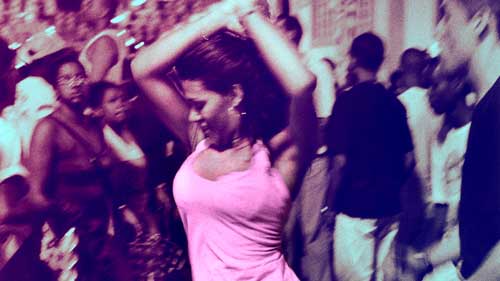Jeremy Marre’s original documentary ‘Beats of the Heart’ – about the emergence of Salsa as an expression of Latino identity in New York – included footage never seen before and great interviews with Rubén Blades, Latino activist Felipe Luciano and many of the salsa stars that with time would become legends of Latin music. The seminal became seminal for those interested in Salsa as more than simply music, but a social phenomenon. The director of that film was, incongruously, an English man named Jeremy Marre. His latest four-part series recently shown on BBC4, follows the journey and huge impact of Latinos on US society through their music, from the 1940s immigrant underworld to today’s J-Lo and Shakira global brand names. What was it like going back to the original people and the places and meeting the new generation?
Jose Luis: How did you get into the whole Latin thing?
Jeremy Marre: Back in the late seventies I went to NY to make a film as part of an independent series a made called Beats of the Heart and had a great time meeting some of the great salsa performers such as Celia Cruz and Tito Puente, Rubén Blades and many others. I loved the music and the opportunity rose and I was asked by the BBC to come on board and work for the series and I said yes I would love to. Ironically the episode I ended up directing was the salsa episode. I did produce the whole thing for the BBC but they wanted me to direct the salsa program, so I found myself leading the theme making a film on the subject back in NY meeting some of the same people I met on the last film, which was a strange experience.
JL: A couple of people were in both of your films, such as Rubén Blades and Felipe Luciano how was it for you to see them after 30 years?
JM: Felipe Luciano was kind of an old friend, that was really nice and he is always very lively and very positive, he has so many ideas and radical projects. It was great to see him. With Rubén Blades the feeling is that he has changed a lot. He just started out with his new band at the moment. He is different to what he used to be when he was at the kind of cutting edge at Fania.
JL: What About Izzy Zanabria?
JM: I had not met him before, but he is an amazing character. He was not very well when we were down there and he made this huge effort to meet us and then we had a terrible technical problem with the sound and we had to go back and do it but he was up for all that. A terrific character, so much part of the whole salsa thing. He was the visual conceptualizer at the label, the guy who took salsa out of the street visually rather than musically. He is a great guy.
JL: I think Izzy is a guy who does not get the recognition he deserves. He used to be the editor of Latin NY and created so many great covers for albums and the actual magazine..
JM: Yeap, exactly, he was always around, always introducing shows, doing PAs and DJing..he was so much part of the scene.
JL: How has Salsa music changed, since doing Beats of the Heart, through the boom and with Rubén Blades becoming an idol to now?
JM: Ummm hard to say. I was really making a film about salsa dura (hard salsa) so that was what excited me, then this salsa got swept away by salsa
romantica, which is something I was not particularly interested in. Going back to it...its more a kind nostalgia industry now really, people looking back to the great days of Fania. There are great bands like La Exelencia who played at the Barbican recently and there are people doing things, but when I talked to Felipe and others, there is a sense that salsa is not an essential part of people's lives any more. It is of another era, a bit like reggae music in a way, there is a parallel. There was a brilliant time for reggae music and it had its time and it made its statements and I don't know how easy it is to revive music and make them real living entities, that is difficult.
So with salsa dura, although it does exist with certain bands today and there are people going out and playing it in thebarrio and there is quality in the music in many ways, salsa is not seen to be the street voice in the way it used to be.
JL: I could not agree more with you! Being a fanatic of Latin Music of that time, comparing it with bands today that still match the quality of the musicianship I still feel the lack of something...was there anyone that you saw this time with that special something or that caused an impact on you?
JM: To be honest we did not see a great amount of new bands when we were over there. We had an incredibly tight schedule and just getting to the guys is hard, you know how the Latino timing works (laughs from both parts), and then we had all those reconstructions to do with the old Mercedes and all that so we did not have much to explore the new scene, it would be unfair to pick anyone out really.
JL: In the last episode of the series you touch on the whole Reggaetón movement, which is the big thing now. What is your opinion on Reggaeton then?
JM: I think Reggaetón is really interesting because it is Latin Music reclaiming the
Streets. I always thought of Latin Music in terms of the music I saw in NY back in the seventies as being a phenomenon that comes from people, every day people and it was making an statement for them. So I think that confronted with some of the awfulness of some of Latin Pop and the artificiality of some of the production and promotion and it has become so much, not necessarilynegative, but frankly it has become part of corporate America, my feelingabout Reggaetón was that it was reclaiming the street for Latin music in quite a dynamic way and mixing so many different styles in creating it own identity, so for me it's an exiting phenomenon. A lot of people already said to me when we were out there filming over there "Reggaeton is already dead". I have not spent enough time in the states and in Miami to dispute that, but seems very popular still to me and that it has something to say in term of it rhythms and blends of rhythms, which very much reflects all the different identities in the States, from R&B, Salsa and certainly from Hip-hop and to me is very much current music.
JL: Well being a promoter of Reggaetón events and music here in the UK I can tell you that is very much alive the whole Reggaetón thing at least from my angle, and it does seem to me that the assumption that "Reggaeton is dead" is very much from the kinda of music industry people who don't really know what is going on in the streets...
JM: Well it is interesting. I did a fair bit of work on the last episode and it was important to me that all the films reflected some street element of the music or tackle some kind of social issue.
JL: Well that is why Beats of the Heart was so good because it was the first time that a film about Latin music showed the social meaning, and talked to people like Felipe Luciano and Ruben Blades.
JM: Well Felipe apart from everything, has a great knowledge of the music as well, going right back to the roots. The social issues are also very important in the 3rd espisode about the Chicano community in Los Angeles and immigration and border issues, which we touch on very strongly.
JL: Have you ever thought of making a film abut the UK Latin scene or the Latin community?
JM: I haven’t really, I know the scene here, I don't know why, it is just in a way I am very aware of what TV wants and what I am required to do. It is quite difficult at the moment and it would make a great subject but not something that has come my way. It is hard to make programmes about Latin music. There is some resistance in British broadcasting, that’s why it was great that the BBC commissioned the Latin Music USA series, it think it was really important this happened.















